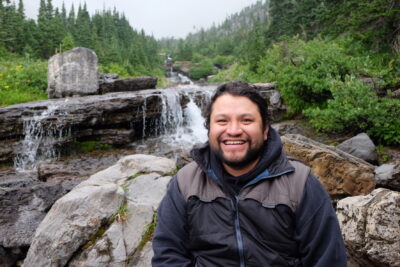
During hot summer nights in South Central L.A., when the only relief came at night with the sweet breeze from the pacific coast. My Mother, a Zapoteca from Isthmus of Tehuantepec, Oaxaca would often take her conversations with my Grandmother in our Native dialect to our apartment’s doorsteps and within hearing range of neighbors. What followed was a barrage of insults from neighbors and kids, mocking our language with unintelligible sounds. Some neighbors went as far as accusing my mother of witchcraft and so, slowly, my Mother stopped taking her conversation full of laughter and love outside, and I started to feel the humiliation and shame in my Indigenous roots.
This past week a recording of a closed-door meeting in 2021, in which LA City Council President Nury Martinez was heard referring to Oaxacans as “a lot of little, short dark people” who are “so ugly,” was published by The Los Angeles Times, exposing one of many wounds amongst the racial tension of my hometown. Ms. Martinez, who also made derogatory comments about Black people, resigned from the Council. Two other Hispanic council members who were heard in the meeting, in which they discussed ways to enhance Latino political power, are facing a cascade of calls to give up their seats as well.
This discrimination is painful and reaffirms what many in the Indigenous community know all too well — that the colonial mentality even amongst the Latino community has never gone away. People from native, pre-colonial communities in Latin America have frequently faced harassment and not just from white people. Among Latinos, who are all considered people of color, studies have found that those who are lighter-skinned are more likely to make economic strides than their darker-skinned brethren, like Black Cubans, Indigenous Mexicans and Central Americans.
This cultural disconnect amongst the Latino community is part of what inspired Fresh Tracks, a cross cultural revolution centered on the healing power of the outdoors for civic action. Because our differences are not a cause to silo our actions to address systems of inequity, but can instead be a powerful source of leadership to bring us together, and lifting up Indigenous values like reciprocity and resilience.
Movements that heal divides, improve systems, and build community cohesion need leaders who can reach across silos and build on the foundational strength of their diversity.
In our society today, there are often siloed responses to problems due to a siloed mindset regarding available resources and actions. Support often enters communities of color with good intentions but misses a meaningful and authentic platform for community and youth-led solutions.
Fresh Tracks programming with young leaders fosters agency and builds power across culture to create direct change in their communities. This applies to all leaders, whether you’re a young Lakota man on a reservation in South Dakota or an Indigenous American woman in central Los Angeles.
I hesitated to write this down, knowing all too well the weight of relived trauma, but the motivating factor in all of this is my 8 month old son, Alexandro. I made a promise on the eve of his birth that I will work to create a future where his identity as an Indigenous Latino member of this world is a cause for pride and joy, as I have come to learn in my adulthood, but grew up afraid to lift up my pride. Moments like this are opportunities for solidarity amongst the Indigenous community and lift the generational joy of our ancestors. For the Native, Indigenous, and Tribal communities of the Americas to stand together against colonialism and the painful reminder of genocide against our families is a hard truth and opportunity to do more together.
As you consider how to stand in solidarity with the Indigenous and Native-led nonprofits and Tribal communities that are working to change this narrative, I urge you to simply write a check to invest in their mission, and trust that they will make the impact. Here are a few ways you can support the change we need:
- Sign up to learn more about Fresh Tracks calls to action at the Forum For Community Solutions, HERE
- Support frontline organizations working with Indigenous Latina community like Comunidades Indigenas En Liderazgo/Indigenous Communities in Leadership, Mixteco Indigena Community Organizing Project, and Community Coalition
- Learn about Native Americans in Philanthropy’s Tribal communities and current philanthropic investments on the Investing in Native Communities platform in partnership with Candid, or sign-up for Indian 101 series.
- If some of what I mentioned above is new to you, pick up and read Decolonizing Wealth by Edgar Villanueva and Fresh Banana Leaves by Jessica Hernandez, PhD as starting points in your learning
In this giving season, consider Fresh Tracks as we continue to work to build a cross-cultural response to systemic inequity and I hope you find healing however that may show up in your life and that some of that is found in the outdoors closest to your heart.
Juan D. Martinez Pineda is a proud product of South Central Los Angeles. A descendant of the Tehuano community of the Zapoteca people from Oaxaca, MX. He is a Senior Manager at the Forum for Community Solutions at The Aspen Institute.